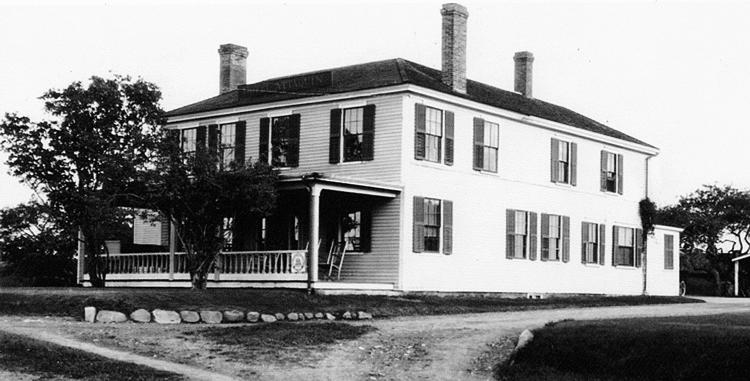A rebuilt Attaquin Hotel, a restored parsonage, and a basketball court at Attaquin Park are among some of the projects the Mashpee Planning Board discussed as future possibilities for Community Preservation Act funds—some of which may become reality sooner rather than later.
The board is responding to a request from Mashpee Community Preservation Committee chairman Andrew R. Gottlieb to submit possible projects to be considered for funding as the town considers putting an end to the program that has been a boon for parks, open space, affordable housing and recreational projects throughout the town and the state.
The Community Preservation Act, or CPA, is a 3 percent surcharge tax that is collected in an account overseen by the community preservation committee and goes to projects that include recreation, open space, historic preservation, and affordable housing. Town Meeting ultimately decides which projects will get funding. Over the years, the town has used revenue from the account to fund pickleball courts on Ashumet Road, a number of park upgrades, land for open space and affordable housing projects.
The town can decide whether to end the program in 2020.
Planning board chairman Mary E. Waygan said that the board has yet to submit its report to the community preservation committee, but will do so in November and likely will advocate that the program continue beyond 2020.
On Wednesday last week, board members spoke about projects that they would like to see go forward using CPA funds.
Board member Dennis H. Balzarini said that he would like to see something happen at the old Attaquin Hotel site, even rebuilding the former hotel. Mr. Balzarini hoped that the hotel could sponsor lectures, perhaps tribal members could host cooking demonstrations, and that the hotel could become a center in the village. “There’s a lot we could do with that property,” the planning board member said.
The hotel burned down in the 1950s, but town planner Evan R. Lehrer said that the hotel is one of the town’s most architecturally significant buildings. Several presidents came to stay at the hotel while fishing in Mashpee, and it was also the town’s first post office. Mr. Lehrer noted that the hotel represents Mashpee when it first came into the modern economy, and that the site now does not do justice to its historical significance.
The board also voiced support of a new basketball court at Attaquin Park. Over the summer, the town moved the hoop out of the former location and away from traffic. The hoop was in the parking lot for the beach, but the current location is accompanied by dirt and grass rather than a hardtop court.
Board member David Weeden advocated for funding for a number of historic homes in Mashpee currently under threat.
The parsonage, the yellow dilapidated house on Route 130 across from the Mashpee Wampanoag Indian Museum, was one mentioned. The parsonage was built in 1849 and is one of the oldest structures in Mashpee. Over the years, Mashpee Baptist ministers lived in the house, as well as Wampanoag tribe members with deep roots in the community, including the Attaquins.
Currently the structure is mostly boarded up, and is unsafe to walk inside. Animals are said to inhabit the attic.
If a proponent did come forward with an application to the CPC, state laws would mandate that the building remains open to the public for a period of the time. The parsonage is currently within the sovereign territory of the Mashpee Wampanoag Tribe.
Mr. Weeden also advocated for the restoration of a home formerly owned by Walter Mingo on Great Neck Road South, also one of the oldest homes in Mashpee. Walter Mingo was a selectman in town for several years, and a long line of prominent tribal members had lived in the house over the years as well. The house has been put on the market and could be purchased by someone outside of the tribe, Mr. Weeden said.
A third house that dates back to the 1800s is also under threat, Mr. Weeden said. The house is within the Main Street Historic District on Route 130 and was formerly owned by the Potter family. He said that he hopes to use CPA money to restore it and put it under protection of the National Register of Historic Places, and that the house could be rented as affordable housing.
Aside from historic properties, the board also noted that a number of lands could be purchased for open space and be added to the Mashpee National Wildlife Refuge.
For affordable housing, the board did not list any specific projects, but Ms. Waygan noted that the town is far behind its goal of 10 percent affordable housing. The board did agree that funding for affordable housing should continue and should be fully funded annually.
Mr. Lehrer also discussed funding for a master bike plan. The town planner noted that the town already has a number of paths for bikes, but a master plan could help bring all the pieces together. The town recently adopted Complete Streets, a Massachusetts Department of Transportation program that accommodates bicycle and pedestrian access in road layouts, Mr. Lehrer noted. A master bike plan could advise the Mashpee Department of Public Works when reconstructing roads which ones could be set aside as a bike access path.
The community preservation committee is scheduled to meet on Thursday, November 8.
By SAM HOUGHTON, Mashpee Enterprise




